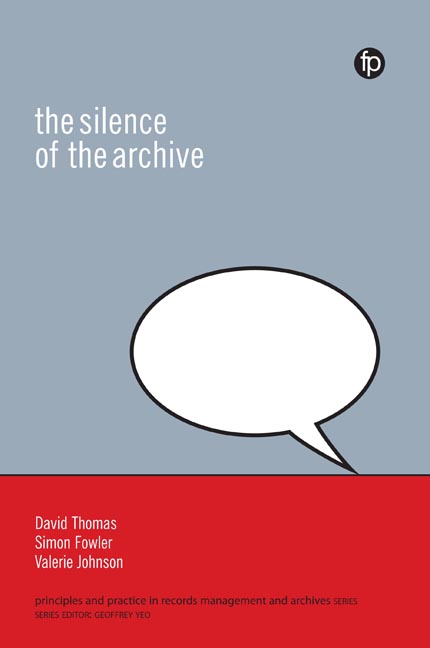Book contents
4 - Dealing with the silence
Published online by Cambridge University Press: 08 June 2018
Summary
Introduction
In this chapter, we investigate silence in the archives: those silences created where records have not been kept, deliberately or otherwise; where some voices have been privileged over others; where voices have been silenced. This chapter will explore these silences, and what can be done to find some echoes and whispers – and sometimes shouts of strong appropriation – to fill the void.
False silences
But first, we need to deal with the concept of the ‘false’ silence. In her final book Lisa Jardine, an ardent user of archives, wrote of the need to be aware of the siren call of the archive that is ‘missing’ and set out her book as ‘a cautionary tale about the trust we historians place in documents and records, and how badly we want each precious piece of evidence to add to the historical picture. And it is a story which illustrates in a number of ways the essential uncertainty which underlies, and ultimately gives purpose to, archival research in the humanities’ (Jardine, 2015, 1). What Jardine was referring to was the longing of historians and researchers to find that golden key which will unlock the secret they are investigating; and how this longing can sometimes lead to assumptions about the existence of evidence which does not in fact exist, or when it does, does not provide the hoped-for ‘Eureka!’ moment. Many archivists will attest to the researcher who says ‘But you must have it’, either believing that the archivist has not looked hard enough, or is concealing something. Sometimes, the hard truth is that the evidence is not, and never was, there.
False voices
We also need to be fully aware of ‘false’ voices. In writing about voice; there can sometimes exist an implicit assumption that voices in the archives are always truthful voices. This is not the case: archives are not the ‘truth’, or always the bearers of truth. Verne Harris, an archivist from South Africa, who worked with the South African Truth and Reconciliation Commission in the post-apartheid era, described preserving and listing security police files from the apartheid regime, and how he and a colleague:
were both disturbed at what these files contained – a destructive mix of misinformation and horrible truth, evidence of personal flaws and compromises, deeds of courage and deeds of betrayal.
- Type
- Chapter
- Information
- The Silence of the Archive , pp. 101 - 116Publisher: FacetPrint publication year: 2017



